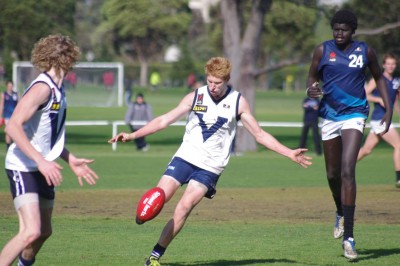There are many ways to coach. Different techniques, visions, goals, values and communication methods. The end results of whatever coaching methods we use is usually measured in the success of the pre determined goal at the start of the season. In senior footy this is usually measured in a Premiership Flag, for juniors it should be about development.
So how do we try and develop junior players so they can move into senior footy, whatever level that may be, so that they can help bring success to their club. Well according to an article written in the In Daily, an independent newspaper in Adelaide, it’s about creating players who think more.
Creating players that think more drastically improves a players ability to impact a game of footy. We need to create thinking players throughout junior footy by mixing games based decision making activities throughout training sessions. The following articles explains this theory.
“The development of ‘thinking’ players will create better team performances and ultimately make Australian Rules football a much safer and enjoyable game for juniors, according to sport experts at Flinders University.
Game-based coaching and game-play practice sessions give junior and senior players alike the chance to be more tactical, to play with purpose and respond more adeptly to the dynamics – and hazards – of the game, says Flinders University coaching analyst Associate Professor Shane Pill, who advises AFL and other leagues around the country.
“Compared to traditional training, which focuses on repetitive drill-based practice, the game sense approach gives players the skills to make better moment-to-moment decisions in a complex and dynamic sport,” says Associate Professor Pill, co-editor of Advances in Australian Football, a new in-depth look at the Great Australian Game.
“Drill based ‘off the line’ training can develop inattention ‘blindness’ that limits players’ perception decision-making and ability to play according to the realities of the game,” says Associate Professor Pill from the Sport, Health and Physical Education (SHAPE) Research Centre at Flinders University.
Now acknowledged as the preferred approach of the AFL coach development department, he says Hawthorn’s award-winning senior coach Alastair Clarkson is a great supporter of the game-sense approach.
“The view of the three-time premiership coach is that young footballers right down to under-10s are being subjected to far too many training drills and not enough football. As a result, young footballers being drafted into AFL clubs not having adequate decision-making skills.
“But the game at the elite level is not the only concern.
“Teenagers should be learning how to play the game by playing it – and learning to enjoy it,” Associate Professor Pill says.
These tactics, along with advances in player selection, player movement, sport medicine and nutrition, are adding to the evolution of the great Australian game, says SHAPE Research Centre director Professor Murray Drummond, co-editor ofAdvances in Australian Football.
“Over time, the game of elite Australian football evolved from a community-based sport to what is now – entirely professional amidst a billion-dollar industry that has enormous social and cultural influence,” Professor Drummond says.
“This book is unique in that it delves into the social, scientific and coaching aspects of Australian football, from elite player level to community ‘grassroots’ engagement and junior player, Indigenous and women player development.
“It explores, challenges and highlights the significance of Australian football in Australian society, as well as the enormous changes that have occurred within the sport since the early 1900s when clubs were starting to emerge.”
The role of elite football in defining masculinity and football club culture is examined in another chapter by fellow Flinders University Sport, Health and Physical Activity lecturer Dr Deb Agnew.
“My chapter, ‘Becoming a star: life as an elite Australian footballer, identity construction and withdrawal from the spotlight,’ is based on research with 20 retired footballers,” Dr Agnew says.
“There is strong evidence to support the influence of Australian football in the development of masculine identity.



